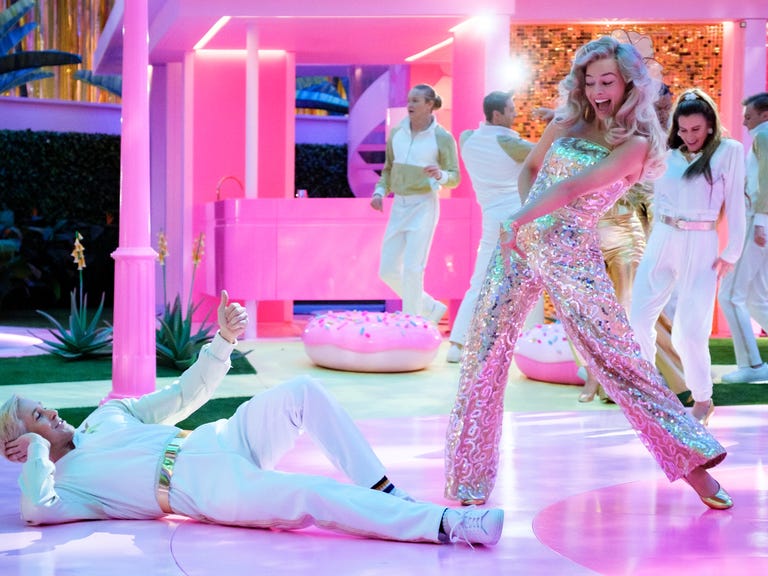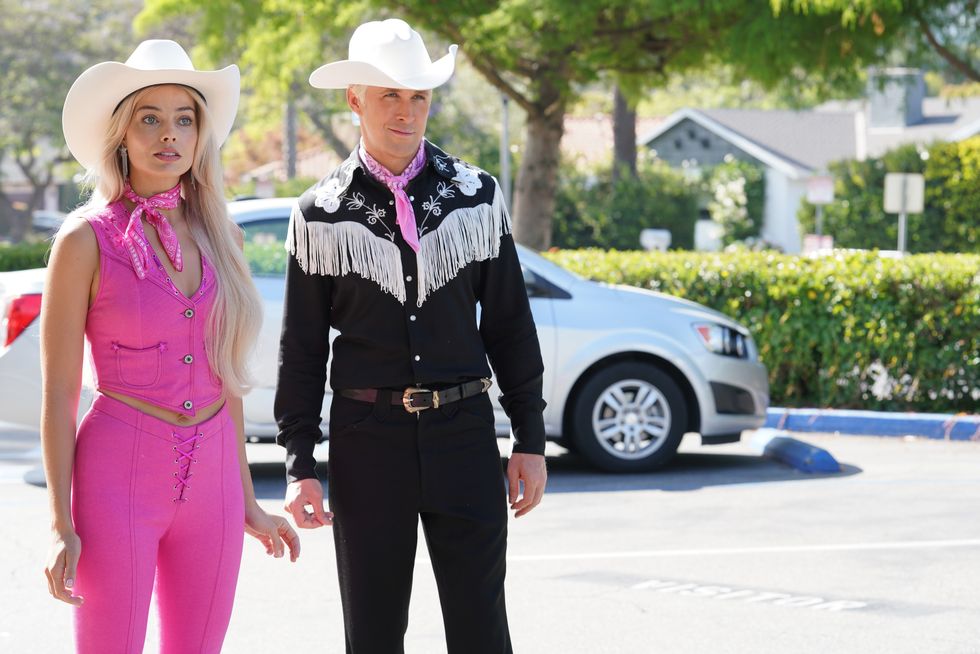If you have not heard, a film called Barbie is out. Did you get caught up in the media tsunami? I was enveloped. By the time I sat down to watch Greta Gerwig’s new film, accompanied with my Barbie-branded popcorn (too sweet), I thought I knew exactly what I was getting: some self-aware jokes, a stellar performance from Ryan Gosling as the beleaguered (as beleaguered as a plastic doll can be, anyway) Ken, a dazzling dance number or two. Those come in the first fifteen minutes, with a click of Barbie’s (Margot Robbie) perfectly arched feet. And then a strange, delightful, cumbersome film ensues, one which will surely delight but also confuse: it is too unwieldy to be the carefree chaser to the shot of Christopher Nolan’s Oppenheimer that many hoped, and it’s all the better for that.
Barbie tells a few stories: one doll’s coming-of-age tale, another doll’s inferiority complex, and a real-life human’s exasperation about middle age. Those are told with varying success, but Gerwig’s penchant for locating the human heart never fails. Sometimes, this tangle of stories threatens to overwhelm the film but by the time the credits roll round, these characters – especially America Ferrera (the exasperated human) – all have an emotionally satisfying send-off. Barbie tells even more jokes. Good jokes, very good jokes, and a few jokes which seem especially written to go viral on a film Instagram account with 16,000 followers. (At one point, around two thirds in, there is a line about the casting of Robbie which made the entire cinema guffaw, and may make you question your sanity.)
But one of its longest running jokes – apparently at the expensive of Barbie parent company Mattel – is also its most terrifying. Once Barbie and Ken hotfoot it to the real world, or as real as Venice Beach can be, news quickly makes it to Mattel’s top brass (the CEO of the all-male leadership team is played by Will Ferrell) via its hapless intern (Connor Swindells). When toys cross over into the real world, it can have disastrous consequences – just go with it, Gerwig asks, and you do! – and so Mattel must do everything it can to get Barbie back in her box.
And so, the villains of the story emerge: Mattel, who have sold an impossibly perfect doll and refuse to deal with the fall-out from its creation. There are some decent jokes here, from Ferrell obviously, and also Jamie Demetriou who plays another board member, but the self-aware shtick overshadows the film’s delicate interplay of light and dark, and muddies Gerwig’s vision. I am sure the writers (Gerwig and her husband Noah Baumbach) were balancing some key interests, but the script is unable to thread the needle, and the toymaker never seems in on the joke, only at the butt of one. By the time the Mattel board turns up in the bloated finale, you may wish never to hear from a toy company again.
Bad news! The American company, second only in size to Lego in toy land, owns Hot Wheels, American Girl, Uno and also makes products for hugely popular franchises such as Frozen and the Disney Princess range. Already, a series of toy-related movies are planned in collaboration with its pictures division, Mattel Films. Take Polly Pocket (with Lena Dunham on board to write and direct) and Hot Wheels (set to be produced by J. J. Abrams’s company Bad Robot). Also planned is an action heist comedy based on Uno with the rapper Lil Yachty. Daniel Kaluuya is attached to a Barney adaptation, which sounds insane (it is) but dinosaurs have a proven track record in Hollywood. Another property, Magic 8 Ball, is apparently inspiring a horror flick.
These projects are appealingly random, the kind that a group chat spitballs on the way home from the pub, but it makes for a dreary prospect at the cinema, both on and off-screen. We just about made it to the end of a promotional cycle in which Gerwig juggled, with admirable charm, questions about turning a toy into a film. But Barbie is good in spite of its criticism (which is not really criticism so much as gentle ribbing) of Mattel: spinning that same tongue-in-cheek narrative across a series of films would be exhausting.
In the States, Barbie currently has a projected opening box office of $110m (its budget was $145m). That sure-fire success will only embolden Mattel Film in its desire to take over cinemas (and, of course, to create more toy-movie tie-ins: a Margot Robbie Barbie doll will set you back around £45). But where does it end? Until we have watched Martin Scorsese’s take on Thomas the Tank Engine? Like Barbie, strapped into a pair of rollerblades on a Los Angeles beach marvelling at the vastness of life, it is enough to move you to tears.
‘Barbie’ is in cinemas today
Henry Wong is a senior culture writer at Esquire, working across digital and print. He covers film, television, books, and art for the magazine, and also writes profiles.














